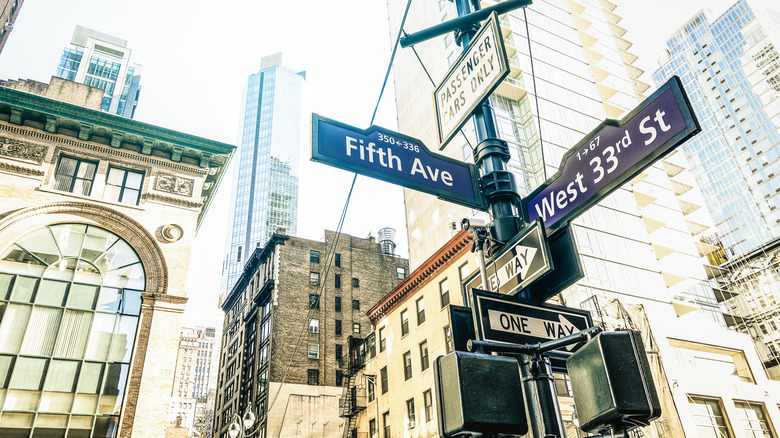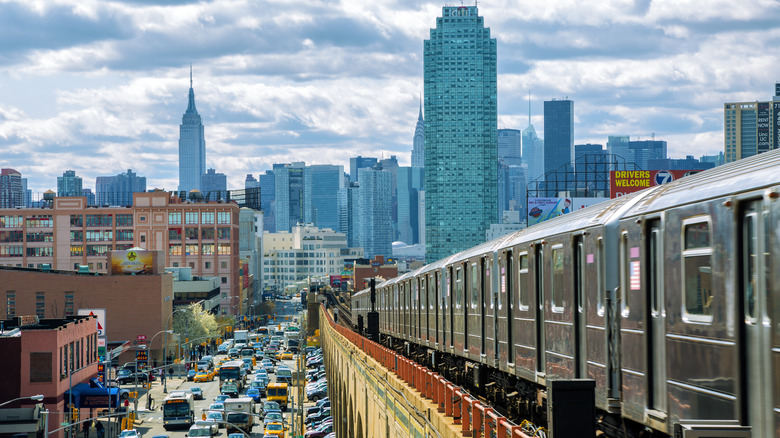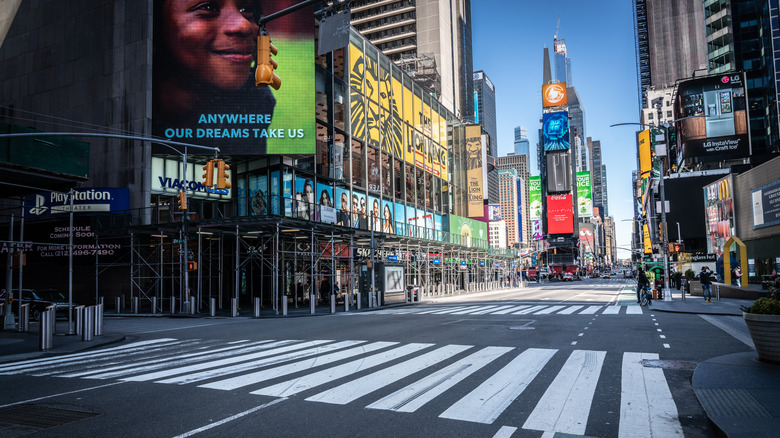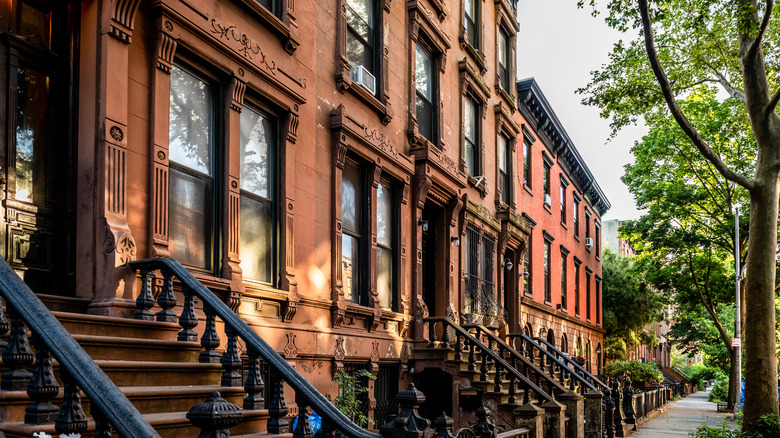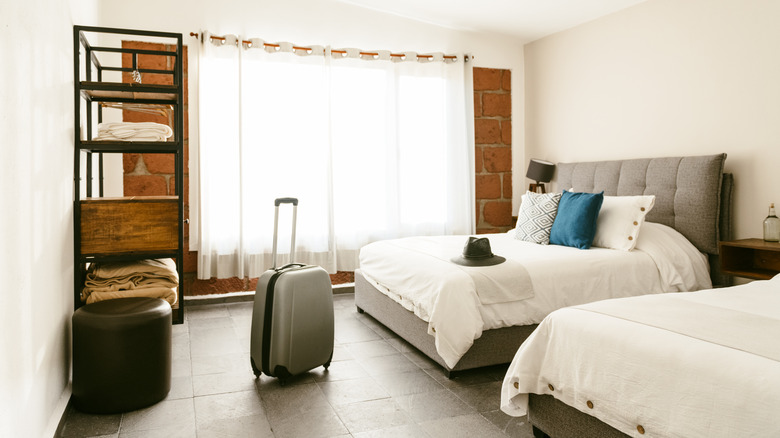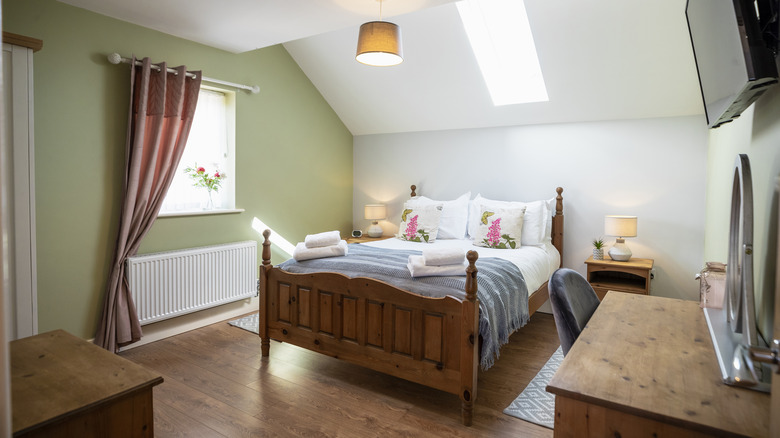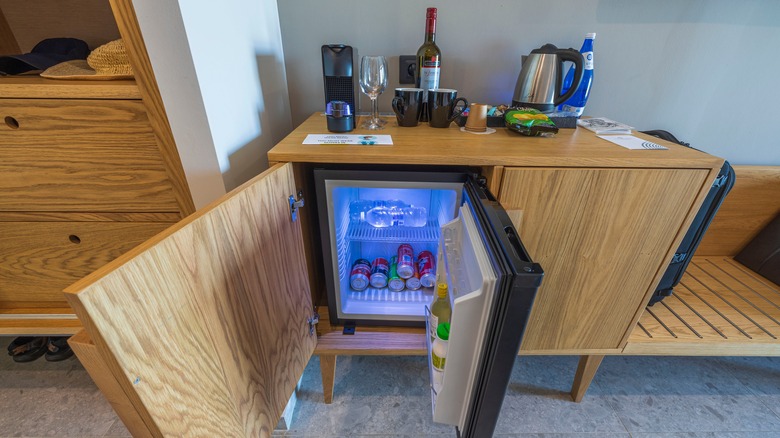18 Tips For Saving On Hotels For Your Next Visit To NYC
New York, New York, city of ... high prices. It's not just visitors and residents that decry the cost of life in the Big Apple, it's also an official statistic. Employment Conditions Abroad (ECA) International, a global mobility firm with offices around the planet, recently released its annual Cost of Living report for 2023 and found that New York City is now the most expensive metropolis in the world. So, not only is a cup of coffee or a decent meal for the family likely to present travelers with sticker shock, but so is the price of a hotel. Isn't that just the news you needed before planning an upcoming trip to NYC?
But fret not weary traveler, there are ways to save those precious pennies. Hotel rooms in New York don't have to cost the price of a multi-day Caribbean cruise or a spanking new 55-inch HD television, per night. With a little bit of planning and some savvy decision-making, visitors to America's most populous city can source lodging that won't send their bank balance plummeting into the red, or their pulse quickening with every step on the sidewalks.
Home advantage
Unless a traveler is going to a destination resort for some rest and relaxation, the role of the hotel is often little more than a place to have a bite in the morning and to rest one's weary head at night. Visitors to New York City hotels are rarely sitting in their rooms during the afternoon to catch up on some binge watching, a bag of popcorn in hand, or sitting by the window to take advantage of the light while finishing that can't-put-down novel. That said, picking a property in the right location, that is suited to the places that you will be visiting, can make or break a vacation.
For instance, if a tourist expects to spend the lion's share of their stay here wandering around the museums of the Upper East Side, like the Guggenheim and the Met, then staying in the West Village might not be the most convenient base. No smart traveler chooses the hotel first, and then builds their itinerary around its position, but rather they look at what they want to see and then source appropriate lodging. So, while it's important to focus on a property that is reasonably priced, it shouldn't be at the expense of the quality of the trip.
Going the distance
Even if you need to choose a hotel that jibes with the places that you will visit in the Big Apple, that doesn't mean that it has to be exactly in the area where you will concentrate your activities. A savvy planner can also look at the public transport connections to the areas they will visit, and see if anything that is more competitively priced sits along those routes.
It's worth making a simple, unemotional calculation to factor in how far you are willing to be from the places you want to explore because if you stay away from the main tourist and business centers, there is a good probability that you will be able to snag a better deal. One of the subway lines that visitors use to get to the Museum Mile, for instance, is the Q train, and this part of its route winds through Brooklyn. To save some coin, travelers can think about staying in the Brooklyn borough and taking the train in, saving some hard-earned cheese in the process.
Size matters, or does it?
There is no magic formula when it comes to equating the number of rooms a hotel has to what its rates will be. Sometimes smaller, independent hotels can offer a better deal, while at other times, it is the larger chains that can cost you less, as they benefit from economies of scale. The key here is that you don't make any assumptions that a Holiday Inn, a chain known for its keenly priced hotels and resorts, located in Midtown Manhattan can necessarily undercut a small, boutique hotel in a residential part of Queens.
Visitors will need to be flexible and look at multiple options — saving money on a hotel room in the world's priciest city is never a one-size-fits-all scenario. What is important to consider is what amenities in a hotel are important to you, and base the search on this. If a front desk staffed with a concierge round the clock is surplus to your requirements, then fold smaller properties into your search. If you like the feeling of anonymity when traveling to a big city, focus more on larger hotels.
In transit
If you want to save money, it always helps to be close to good public transportation options, an effective way to keep costs down and a smart method for avoiding getting expensive cabs everywhere. Luckily New York City has a deep, far-reaching public transit network, comprised of a reliable subway system and a comprehensive bus network. If getting to places quickly is a priority, travelers should choose to be near the subway, since buses are often held hostage by the Big Apple's notoriously bad traffic (a mobility report published in 2018 showed that across the city, the average bus speed was less than 8 MPH, only double the speed that most people walk).
In Manhattan at least, most parts of the city are never more than a few blocks from a subway, so finding a hotel that is both well-connected and reasonably priced shouldn't be that difficult. In the other boroughs, visitors might find themselves a little more reliant on a bus/subway combination to get around, depending on their search area.
Look for opening specials
In the same way that new restaurants might offer an opening special in order to get customers in the door, a hotel that has just debuted for business might promote discounted rates to drum up interest. These special rates are also a way for the property to fine-tune its products and services and work out any kinks. After all, the "soft opening" phase, as this period is called in the business, is the first time that the hotel has actually had paying guests staying in the rooms, eating at the restaurants, and using the facilities.
This is when the management will assess all the processes that are part of the daily hotel routine, from security to front desk, housekeeping to meal service, the internal workings of all the mechanical systems and how they translate to the guest experience, and learn what is working and what is going wrong. If you do manage to get into a hotel at this nascent stage in its existence, also be aware that the property might have some missteps, some teething problems, as it works its way up to full speed. These, however, are likely to be minor, and definitely worth the better prices that you will enjoy.
Book directly
While comparison sites are a great source for seeing what is available out there, and often can give you a better rate than booking directly with an airline, car rental agency, or hotel, travelers should try to use them only to look at prices and choices. Once you have found a deal for a property that you want to book, try to reserve that same rate directly with the hotel itself. This doesn't always work, as hotels do sometimes block off a stock of rooms to online travel agencies at lower rates, a way to advertise their products to a wider audience, but hotels can also offer a best-price-match guarantee and will provide the room at the same rate that it can be found elsewhere online.
There are definitely benefits to booking directly with the hotel — if you have an issue with the booking, you won't have to resolve it through the online agency that you reserved with. And by booking directly, the property doesn't have to offer any cut to an outside business (which, of course, is preferable for the hotel, and might mean that it treats you a little nicer).
Travel smart
There are peak seasons to travel to any location in the world, and a number of factors can decide what those times are. Often, they coincide with when the weather is most enjoyable, and this can also be when schools have extended holidays, so more families are out and about to enjoy the free time and fine climate. Sometimes peak times fall around major national holidays, or a large festival or event. As the name suggests, peak seasons are the times of the year when competition to grab a hotel room is at its most intense, and this typically means that prices for available rooms skyrocket.
If you can time your trip so that it occurs off-season, there is a strong chance that you will be able to get a much better rate for the room than you would during peak season. Of course, this is easier said than done, and trying to coordinate vacation times with family, work, and other scheduling commitments isn't straightforward, and often means you have little choice in when, and for how long, you can travel. But, a little flexibility in dates can go a long way toward saving you money.
Simplify your stay
As we've already mentioned, a city hotel isn't a place where a traveler spends big parts of the day, at least not doing things — it's generally where you will grab breakfast and go to sleep. So, if you are going to be out and about all day and evening, taking meals elsewhere in the Big Apple, going to see sights around town, having dinner near Broadway before catching a show, and grabbing snacks along the way, do you really need a hotel that has a wide range of amenities? Consider this: When was the last time you actually used the concierge or front-desk service at a hotel to glean some local intel? With so much content available online like reviews and in-depth perspectives and tips, most travelers won't even bother with the hotel staff for tips.
If your answer to that earlier question is never, or more than a couple of years ago, then think about booking a bed and breakfast, which won't have all those extras that you don't use anyway. Despite the name, these properties don't always offer breakfast, but what they do promise is a more homely, personal experience, since they are typically rooms in somebody's house, or a home converted into individual bedrooms, with some shared facilities (like bathrooms), and, therefore, loaded with a more residential sensibility that some travelers might actually prefer. For some guests also, the authentic, personal feel of a bed and breakfast is hard to beat.
Weekend warrior
New York City is the nation's nexus for so many sectors of industry — fashion, finance, media, and more — which means a lot of business is done here. And we mean a lot. During the week, when deals are brokered and contracts are signed, New York hotels are usually packed with corporate travelers, many of which are on smaller expense accounts than in the swinging days of the early 2000s. Still, there is enough money circulating through the city's arteries to ensure that hotels are doing brisk business during the week.
Weekends are a different matter, and those same properties that house the titans of industry from Monday to Friday are strangely quiet on the weekends, meaning that rooms there are definitely a buyer's market. Weekends are a good time to snap up a better deal on a room, with Sunday night often the best bargain of all, and while this aspect of visiting NYC might seem counterintuitive to the average leisure traveler, it is an option worth taking into account.
Pick the right room
When searching for a room, travelers are often given a couple of choices for rates — one that is flexible and that allows for cancellations close to the date of travel, or free changes in dates, and one that is the absolute rock-bottom price, but that comes constrained with no flexibility. While this story is about saving money on a hotel room in NYC, and it might seem logical for us to recommend the second option, we implore travelers to choose a room that is flexible/refundable, even if it costs a little more. These bookings typically allow visitors the opportunity to cancel the room for up to 24-48 hours before their check-in date with no penalty and no payment required (though sometimes there can be a hold on a credit card, but this goes away).
By doing this, you can keep searching for a better deal, all the way up to a couple of days before your trip, knowing that if you do find one, you can cancel your original reservation with no repercussions. That way, you can keep looking for a better deal. If you do decide to go this route, remember to cancel your first booking if you subsequently find a more attractive rate elsewhere — this is an easy thing to forget to do — otherwise, you'll be saddled with two rooms for the same dates, which really isn't a smart way to save money.
Check the fine print
On searches for hotel rooms, online surfers might find a super-special deal advertised that seems almost too good to be true. If that's the case, then it probably is. The price might be the base rate for the room and doesn't factor in other hidden fees that a hotel can charge. Once you add in these additional costs, suddenly the room rate isn't such an attractive one after all.
These fees come under different names. For destination resorts, these extra charges often fall under the umbrella term "resort fee." In New York, room quotes don't always include the occupancy tax, which is 5.875%, and added to the city's sales tax of 8.875% on many goods and services, this extra chunk payable hits 14.75%. (Interestingly, this occupancy tax is not charged at private houses that have rooms available for guests to rent, the bed-and-breakfast type set-up). Some hotels in the Big Apple also drop in a facility fee, and while nobody can really be sure what this is for, it can tack quite a lot extra onto the bill. Before finalizing a booking, be sure to check all these hidden amounts before deciding whether the room is really a bargain or not.
Think about hostels
While, for some, the idea of a hostel conjures up images of haphazard, prison-like dormitories filled with students and budget travelers crammed onto bunk beds, in buildings where the bare minimum is done to keep them functioning, that picture isn't always reflective of the reality. Many hostels are extremely professionally run, tightly organized businesses that pride themselves as much on their amenities as their sense of bonhomie, conviviality, and being a melting pot where ideas, suggestions, and stories are shared.
Some even come with private rooms, with ensuite bathrooms, even if that's not what they are generally known for. While it is likely that they won't have the kinds of amenities that established hotel brands might use as selling points, hostels do come in all shapes and sizes, and do a good job of fostering a sense of community that is less obvious in standard properties. They are also, generally, competitively priced, which isn't surprising considering their main target audience.
Consider going communal
Even if you are able to get a private room at a hostel, or you make a booking at a bed and breakfast, getting your own bathroom isn't a guarantee. Sometimes this style of accommodation requires that the guest make certain sacrifices, and this can include access to an ensuite toilet.
While this might be an inconvenience to some travelers, it will be perfectly acceptable to others, and this small adjustment in facility requirements can make a big difference in the room rate. It's important to note that just because a bathroom is communal, it doesn't mean that it's unclean — these aren't public toilets in a city park or busy train station, but restrooms that are for dedicated use for a select few rooms. So travelers should ensure that they have the right perception about a shared bathroom before making an educated decision. If not having a private bathroom is a deal-breaker, then this arrangement will not suitable be for you.
Don't discount discounts
Hotels might often claim that they offer the best rate for a room, and that assertion can be completely accurate, but there are also times when a hotel's own rate isn't actually the best deal around. There are discount sites all over the Internet that work on the model that they will undercut a restaurant, spa, entertainment facility, service provider, or even a hotel with daily deals that users would be crazy not to take advantage of.
Think of these as flash sales for properties, and as such, you may be limited in choice as to what hotels you can choose, and the dates for which any particular hotel is available. Sites to check out include LivingSocial, which has a number of New York City hotels on its listings for any given time frame. One thing to check before going ahead and booking with these sites, though, is whether the price offered by them is really any better than that offered by the hotel directly. Just because it appears on the discounted site, don't always assume that it is.
Test your loyalty
Like other businesses that want to know anything, and everything, about their customers, hotels use loyalty programs as a way to learn more about the people that stay in their rooms. In return, they will provide anyone that signs up to join the program with perks, benefits, and specials as a way to keep them loyal and happy.
Getting on board with a hotel loyalty program is a good way to access bonuses for a hotel brand that non-members aren't eligible for. Some of these can be as simple as getting news on new openings, or even discounted room rates, but the most obvious benefits are through the accumulation of points — which you will only do if you keep booking rooms with the brand (it's called a loyalty program for a reason). Rack up points and you can use them for goodies such as credits on food or beverage, special room rates, upgrades, and more.
Pick a package
Chances are if you are booking a hotel room in New York City, you don't live in the Big Apple (apologies to readers that are planning on having a staycation in the city). In that case, your trip might include airfare, hotel accommodation, and possibly car rental for visitors that want to drive in New York. You may opt to buy these components separately, but if you buy the same combination from a travel agent — either an old-fashioned, bricks-and-mortar physical one or an online agency — it might work out to be much more reasonable.
Agents can get preferential rates from travel providers of all sorts, negotiating these on an ongoing basis, and these discounts are passed on to customers, after all, huge volumes of bookings are what drives the business. When booking a package though, be sure to read all the terms and conditions very carefully. Maybe you can't change or cancel the hotel without paying a penalty (or worse, you can't cancel at all), or perhaps the flight booked isn't at a convenient time. Possibly, you are only eligible for the most basic car class. If you compare the package with what you would book independently, and find a marginal difference in quality, but a generous difference in price, then snap up the deal.
Never use the hotel phone
Gone are the days when we all relied on landlines to communicate with people far away or a few blocks around the corner. Now, we all have cell phones, and while the roaming plans vary, most are able to load apps that allow for quick, free, or at least very reasonably priced, communication to anyone, at any time. And yet, there is something so irresistible about a landline phone, something serious and important about it, and for people of a certain generation, an undeniable fondness for this mode of talking with another human.
With that pull comes the temptation to use the hotel phone, even for a quick local call, but at all costs, avoid the urge. Unless the hotel clearly states that calls are free (and even if it does, check what calls are free, within the local area, or further afield?), using that phone can land a hefty charge on your bill. Hotel phone services are notoriously expensive, though there is no real reason that they should be. Receiving a call on a hotel phone, however, is free. Another pricey amenity in the hotel is the minibar, which can charge more than double for an item than at a store down the block. Some minibars have sensors under each item inside them, so even if you pick up a can of soda, for instance, and immediately put it back, the cost of that item will be charged to your room. Just say no.
Risk booking at the last minute
Hotel room pricing is a complex, multi-faceted beast, and on any given day, at any given time, 10 rooms next to each other on the same floor might all have been priced differently. The basic principle though, as any market economist will tell you, is governed by supply and demand, so when demand is high — such as during peak season — the prices rocket.
On days where supply has the upper hand, prices drop. Some hotels will keep rooms empty if a certain price threshold isn't met, but others like to always keep their rooms full, and in order to do that, they offer great last-minute deals. If you are willing to try this option, you can try your luck and wait until your trip nears and hope that you can hook a last-minute booking. But this is never a certainty, and relying on this method alone might also be like playing Russian roulette with your precious time off.

